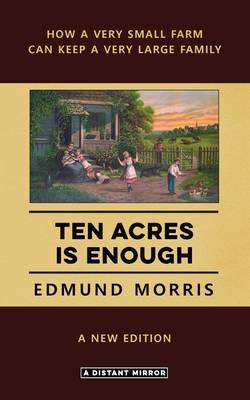
- Afhalen na 1 uur in een winkel met voorraad
- Gratis thuislevering in België vanaf € 30
- Ruim aanbod met 7 miljoen producten
- Afhalen na 1 uur in een winkel met voorraad
- Gratis thuislevering in België vanaf € 30
- Ruim aanbod met 7 miljoen producten
Omschrijving
"Recently we have seen a great back-to-the-land movement, with many young professional people returning to small scale farming; thus it is great fun to read about someone who did exactly the same thing in 1864. In that year, Mr. Edmund Morris gave up his business and city life for a farm of ten acres, made a go of mixed farming and then wrote a book about it. Mr. Morris proves Abraham Lincoln's prediction: 'The greatest fine art of the future will be the making of a comfortable living from a small piece of land.' Kudos to the publisher for resurrecting this fascinating treasure."; - Sally Fallon Morell, President, The Weston A. Price Foundation
Reviews
"This book may be old but it's one of the best I have read with regards to starting a small farm. Definitely a book any small farmer who does things the right way can appreciate."
"I rated this book with 5 stars because I enjoyed it a lot. Even though it describes farming processes about 150 years old, the information it offers is applicable to today's small truck farmer. I loved reading how he cleverly learned how to increase his crop quantity and quality. A lot of his ideas could be put to used by just about any vegetable and fruit grower. It was also amusing and educational to see the costs and earnings then and realize how much our dollar has depreciated."
"...excellent book. Amazed it was written almost 150 years ago. Farming principles in the book still apply to any small farm today."
"This book has been a great inspiration for me. It is a demonstration of a philosophy worked out a highly productive manner. I recommend this book to friends and think of it often as I work in my garden."
DESPITE THE FACT THAT IT WAS FIRST PUBLISHED IN 1867 - or perhaps because of it - this book has something for everyone; for the small farmer, the home gardener, the city dweller who wonders whether there might not be a better life in the country -- and for anyone who has an idea, and needs just a spark of courage and inspiration to make it happen. This book may be about farming and homesteading, and indeed it is a delightfully readable autobiography of a farmer in the America of the 1860s, but it also about much, much more. The challenges that faced the author are timeless, as are his courage, commitment, and ingenuity. There are insights for anyone, farmer or not, in this book.
Contents
1. City Experiences Moderate Expectations
2. Practical Views Safety of Investments in Land
3. Resolved to Go Escape from Business Choosing a Location
4. Buying a Farm A Long Search Anxiety to Sell Forced to Quit
5. Making a Purchase First Impressions
6. Planting a Peach orchard How to preserve peach trees
7. Planting Raspberries and Strawberries Tricks of the Nursery
8. Blackberries A Remarkable Coincidence
9. The Garden Female Management Comforts and Profits
10. Cheated in a Cow A Good and a Bad One The Saint of the Barnyard
11. A Cloud of Weeds Great Sales of Plants
12. Pigs and Poultry Luck and Ill Luck
13. City and Country Life Contrasted
14. Two Acres in Truck Revolution in Agriculture
15. Birds and the Services they Render
16. Close of my First Year Its Loss and Gain
17. My Second Year Trenching the Garden Strawberry Profits
18. Raspberries The Lawtons
19. Liquid Manures An Illustration
20. My Third Year Liquid Manure Three Years' Results
21. A Barnyard Manufactory Land Enough Faith in Manure
22. Profits of Fruit-growing The Trade in Berries
23. Gentleman Farming Establishing a Home
24. Unsuccessful Men Rebellion not Ruinous to Northern Agriculture
25. Where to Locate - East or West
Specificaties
Betrokkenen
- Auteur(s):
- Uitgeverij:
Inhoud
- Aantal bladzijden:
- 214
- Taal:
- Engels
Eigenschappen
- Productcode (EAN):
- 9780980297638
- Verschijningsdatum:
- 16/06/2009
- Uitvoering:
- Paperback
- Formaat:
- Trade paperback (VS)
- Afmetingen:
- 127 mm x 203 mm
- Gewicht:
- 235 g

Alleen bij Standaard Boekhandel
Beoordelingen
We publiceren alleen reviews die voldoen aan de voorwaarden voor reviews. Bekijk onze voorwaarden voor reviews.











